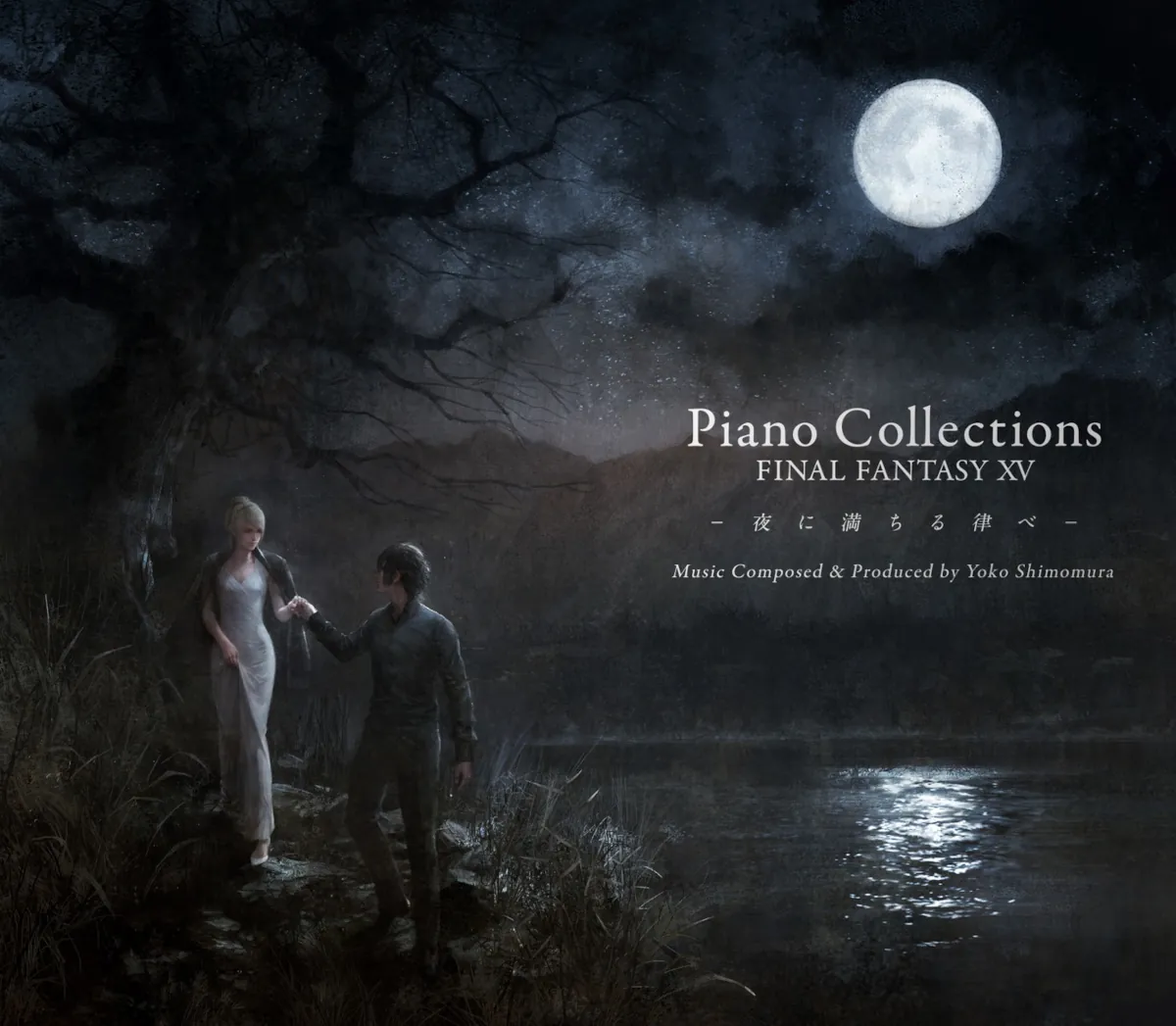As much as I enjoy the original soundtracks for the Final Fantasy series, I generally get more enjoyment out of their piano collection counterparts. At their best, the arrangements capture and elaborate upon everything integral to the original compositions whilst stripping away all of the “fluff.” In doing so, they somehow reach a new level of expressiveness and grandiosity or draw attention to some aspect of the music that I hadn’t appreciated before. Like many other RPGFan editors, I highly regarded Final Fantasy XV‘s original soundtrack, so I was very excited by the announcement of Piano Collections Final Fantasy XV: Moonlit Melodies, and I eagerly dove in when the opportunity came.
Previous piano collections generally seem best suited to evening listening, but, as the title and artwork indicate, Moonlit Melodies best fits into the later hours. In contrast to its stylistically-varied predecessors, this release is much more focused: moody, sombre, dramatic, and explosive, like Noctis and friends in Chapter 10. The two opening pieces “Dreaming of the Dawn -Somnus-” and “Of Bygone Days -Sorrow Without Solace-” set a brooding and romantic tone that never really relents. While “Starlit Waltz” provides some playful respite from the darker atmosphere, its regal and upright bearing ensures it complements the rest of the album. This may disappoint some, especially since the original soundtrack contains a diversity of tracks that conceivably would have transitioned to a solo piano setting easily. I also expected more diversity initially, as with previous entries, but I appreciated the narrowed focus by the final piece. It gives the album greater thematic and emotive coherence and distinguishes Moonlit Melodies from other piano rearrangement albums.
Most features that listeners will expect of a good piano collection album are present. Sachiko Miyano and Natsumi Kameoka’s arrangements are thoughtful and creative, but ultimately respectful. Additional musical sections flesh out each track and render them more engaging as stand-alone tracks. Most pieces have introductory and concluding passages, or are structured to culminate in a dramatic climax, or change key signatures partway through, and so on. Utilization of the full pitch and dynamic range of the piano compensates for the loss of additional instrumentation, enabling the music to reach the same feelings of movement, grandness, and expression as the original soundtrack. Where an instrumental group would enter or leave, the piano might move towards higher or lower registers or expand or contract the pitch range. Ambience and the heavy reverberations of the recording space become almost as integral to the music as the piano itself, whether it involves giving an added depth and expressiveness to sparser moments where single notes or chords hold the line and gradually echo away (the two opening tracks), complementing the lush dreaminess of trickling down piano keys (“Serenade Fantastique for Piano -NOCTIS-“), or giving extra weight and menace to sections that rely more heavily on strong, punchy chords or the lower end of the piano’s pitch range (“Rulings and Revelations -OMNIS LACRIMA-“).
That said, minimalism isn’t an especially defining aspect of the music as with other piano-centric releases (like the I Am Setsuna soundtrack.) Romanticism is a stronger influence than Satie-brand impressionism. Sparse moments are plenty, but these are always contrasted with fuller and more energetic sections that showcase some incredibly emotive and virtuosic performances. The music is more directly passionate than detached, and individual pieces see much more change and progression.
Personally, my highlights include the two opening tracks for defining and establishing the tone of the album: opening softly, gradually expanding in pitch range and building in volume towards a dramatic outpouring of emotion, and then quietly contracting and fading away. The gentle melancholia and major key signature of “Serenade Fantastique for Piano -NOCTIS-” is also enjoyable as a more active and less ambience-dependent alternative to the former two pieces. Overall, I was most surprised and impressed by the arrangements of battle tracks like “Drunk on Darkness -Veiled in Black-” and “Rulings and Revelations -OMNIS LACRIMA-” that feature the most dazzling displays of virtuosity and some especially dramatic shifts in dynamics. Most significantly, in moving to the piano, these pieces sound as if they could be underscoring a passionate outpouring of emotion or an inner conflict of feeling as much as overt battle. This extra dimension of emotion is typically absent on the combat tracks on other piano collections, at least in my experience, and is testament to the talent of the arrangers and performers.
Discerning readers might notice that three (out of six) pieces from the piano arrangement bonus CD that accompanied the FFXV limited edition OST are absent. Though I understand the reasons for their absence, perhaps it would’ve been nice to include a couple more, as the quality of those arrangements easily matches those included on this release, and only one of them conflicts with Moonlit Melodies‘ atmosphere. In any case, greedy completionists will have to find another way to acquire the other three tracks.
There’s nothing particularly negative I can say. Overall, Moonlit Melodies is what most would expect it to be—a brilliant arrangement album of a brilliant soundtrack for a brilliant game. It exemplifies (and potentially redefines) what the piano arrangements are about. Some listeners might be somewhat disappointed by the comparatively limited emotive and stylistic range, but the added thematic unity, the strength of the performances, and the creativity of the arrangements more than compensate for this, making Moonlit Melodies an especially memorable entry in the Final Fantasy Piano Collections series. Highly recommended!





